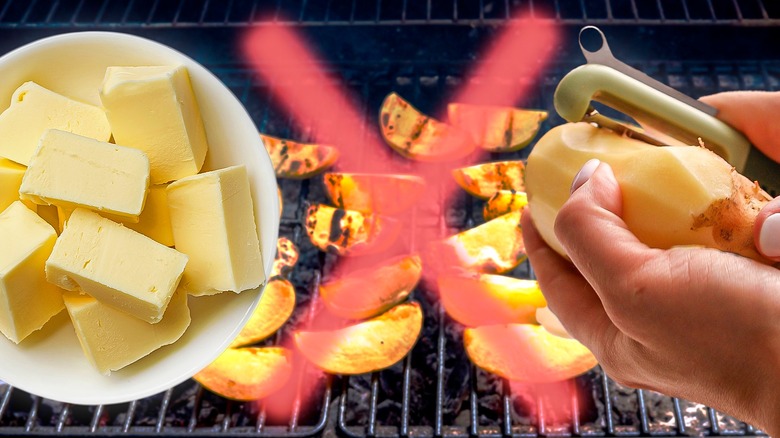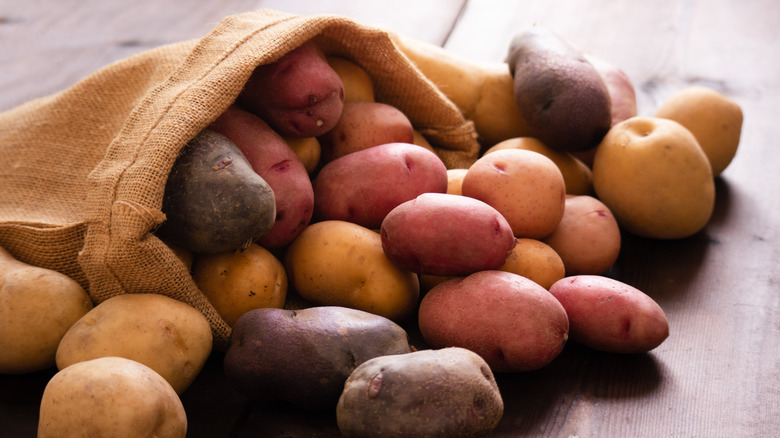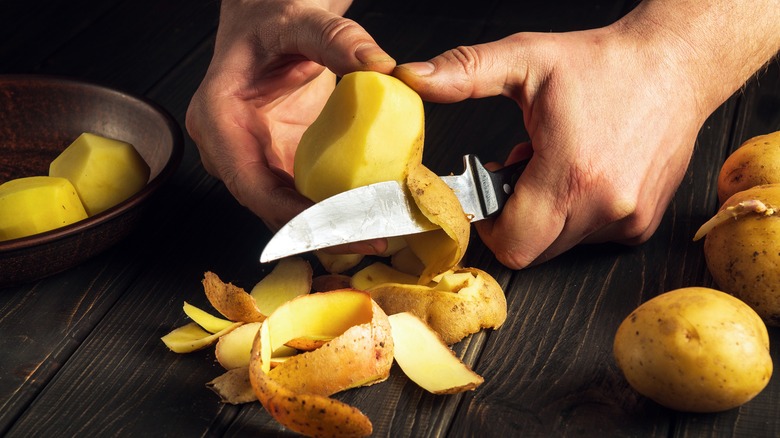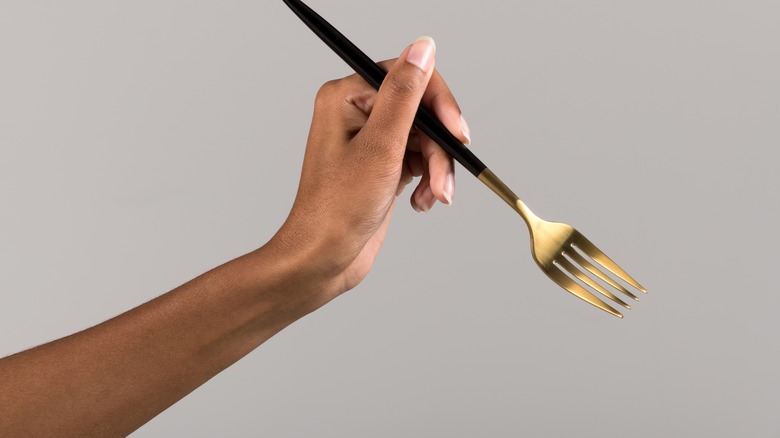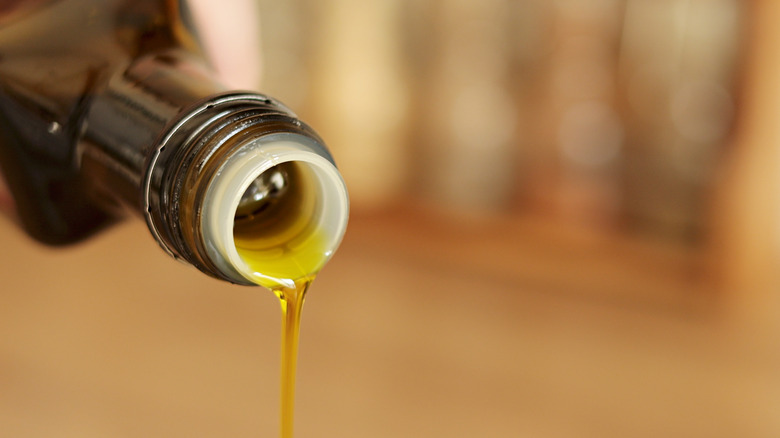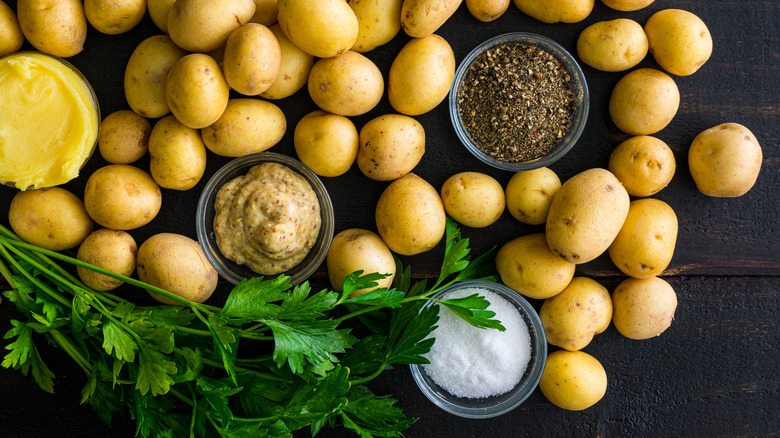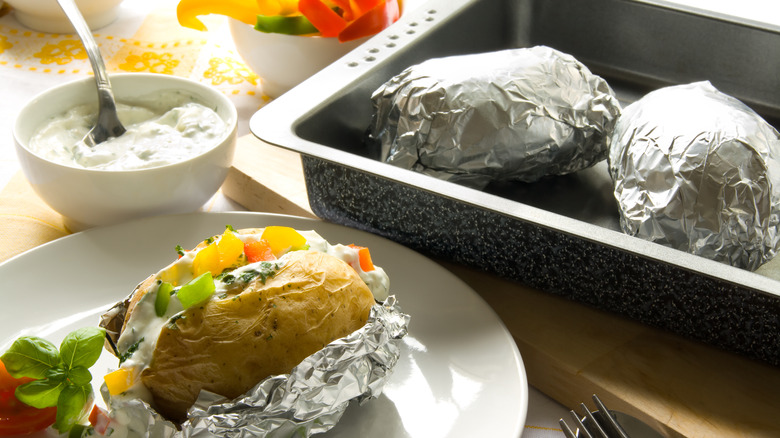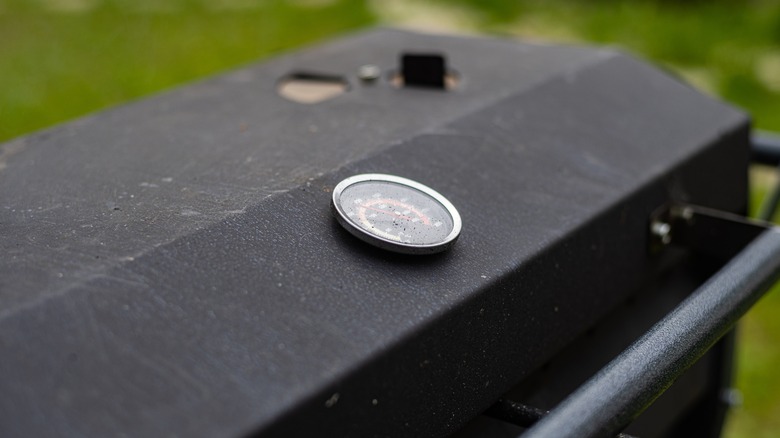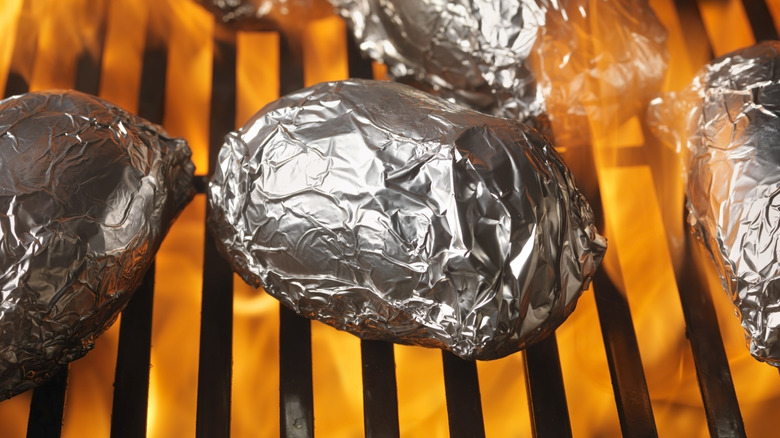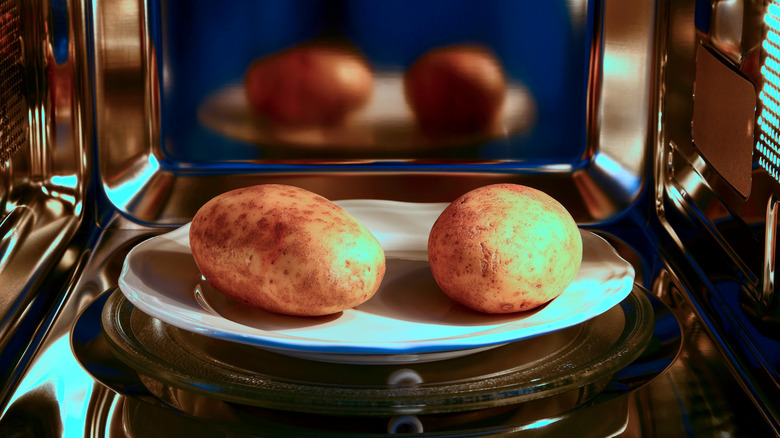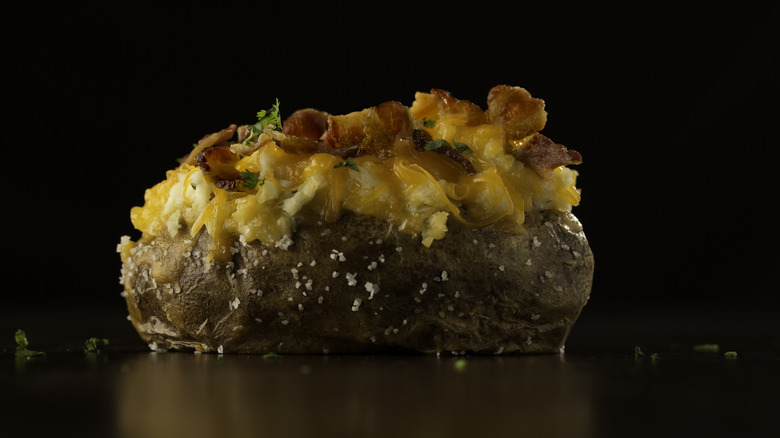10 Mistakes Everyone Makes When Grilling Baked Potatoes
Have you ever attended a cookout and watched someone royally mess up the baked potatoes? The cooking process is uncomplicated, but some basics can't be skipped when preparing this simple but delicious root vegetable for the grill. If you're not in the know, you're likely burning the humble spud every summer and making the more experienced barbecue enthusiasts bristle. Don't panic! We asked three experts to walk us through the process to right the wrongs.
It turns out most of the errors when baking a potato on the grill happen during preparation. If you slow down and get the initial steps right, you're destined for creamy and fluffy spuds in T-minus one hour (if you've preheated the grill). Many grill options exist, from gas and coal to smokers and pellet. They all work a little differently, but we touch on that so you can navigate the fiery gauntlet with confidence the next time you're making baked potatoes.
Choosing the wrong potato and different sizes
Baking a potato on the grill calls for a specific type of potato, so leave the waxy baby/new potatoes for another dish on another day. According to Potatoes USA, America's potato marketing and research organization, there are 200 varieties of potatoes in the U.S. They fall into seven categories: Russet, red, white, yellow, blue/purple, fingerling, and petite. If you're stumped on what potato to choose, cookbook author and recipe developer Brian Theis makes it easy. "Choose a Russet or a floury starchy potato of similar size as a Russet, like an Idaho or Burbank," he advises. "Go with starchy, never waxy, unless you have a specific recipe that calls for those," he adds. You can read more about the difference between waxy and starchy potatoes here. If you're grilling for a group, choose potatoes that are the same size, so they'll have the same cooking time.
The ideal baked potato is large enough to be eaten on its own or to be a side to any food you're grilling. Also, choose a potato with a thicker skin so it can hold up while being handled on the grill. It must also have starchy makeup because starchy potatoes break down easily during cooking, giving the fluffiest, creamiest texture.
Peeling the skin off
This is truly for the novices. A potato is a baked potato because it is baked in its skin. It's baked whole then sliced open and topped with delicious ingredients like butter, sour cream, cheese and more. A potato is usually only peeled for roasting, mashing or making soup.
Nicole Johnson, founder and recipe developer at Or Whatever You Do explains, "I know some people don't like the skin left on the potato. When it comes to baking a potato in the smoker, put the peeler away." An expert with grilled and smoked food, she adds "The potato bakes for a while and the skin helps hold everything together." She suggests that if you have an issue with the potato skin, for instance, because it comes into contact with the dirt, then just eat the contents of the potato and leave the skin on the plate.
Not poking holes in the potato
If you haven't baked a potato for a while, you may find yourself standing in front of your grill, oven, air fryer, or microwave with a potato in your hand wondering if you should prick holes in it before cooking. It is a bit of an old wives tale but we can't let it go, even if celebrity chef Rachael Ray's experiments tell us otherwise. Nicole Johnson has had potatoes explode on her while baking.
"One of the most common mistakes is not poking holes in the potato to let steam escape. I've done it a couple of times, and that's all it took," she shares. "You hear a pop and when you open the grill some of the potato 'guts' have spilled out." Use a fork or skewer to get the job done. "The exact number of pokes doesn't really matter as long as there are holes to let the steam escape. I normally give it 6-8 pokes with a fork and with a skewer, probably 10-15," explains Johnson.
Not oiling the potato enough
Food scientist Dr Bryan Quoc Le advises that using oil on your potatoes before cooking will help evenly transfer heat across the potato. The oil also helps to crisp up the skin. Don't be afraid of getting your hands dirty when adding the oil. Once the potatoes have been washed, dried off and their skins pricked, drizzle them with oil and use your hands to slather oil across the entire surface of the potato. Just make sure you wash the oil off your hands again before picking up the barbecue tongs.
"You want the outside to be crispy and the inside to be tender and fluffy," says Nicole Johnson. "Don't be shy with the oil on the outside of the spuds." She uses avocado oil. "It is neutrally flavored, has a high smoke point, and is said to be one of the healthier options for commercially available oils."
Not pre-seasoning
Just because you're grilling the unassuming potato, doesn't mean it won't benefit greatly from lots of pre-seasoning to elevate the dish. "If you get the salt right, not just how much but when and how and in what form to add it — you can get your food, really, really close to being perfect," says chef Samin Nosrat. Dr. Bryan Quoc Le, explains why: "There are many umami-enhancing compounds in potatoes that need salt to activate the delicious flavors. Most of the flavor in potatoes comes from a reaction called the Maillard reaction, in which the sugars and amino acids found in the potato react together during the cooking process. This leads to the production of flavor molecules."
When you add salt, it helps to dehydrate the surface of the potato, which increases the speed of the Maillard reaction. "It gives crispier textures and more flavors," he adds, so season up! Brian Theis, recommends adding salt and olive oil before you wrap your spud in foil for the grill, or slices of onion and butter. "It makes for even more moisture and flavor," he says.
Not using foil
To bake a potato on the grill, it needs to be wrapped in foil. If you're not wrapping it, the skin will likely burn and it won't cook through. Here's why: "Grilling potatoes can be challenging because a grill is using dry heat to cook foods," explains Dr Bryan Quoc Le. "Placing a plain potato on the grill will lead to rapid dehydration and burning. Potatoes need both moisture and time for the starches to break down and form the desirable texture and flavor we associate with grilled potatoes," he adds. "It's best to wrap potatoes in foil to keep the steam formed from the grilling process inside, which helps convert the raw starches into a form that's soft and creamy."
However, there is a caveat. Nicole Johnson says a mistake she often hears is when people wrap their potatoes in foil when using a smoker or pellet grill. "You might as well cook them in the oven if that's your plan," she says. "You're losing out on all that flavor you get from the wood fire if you're using a smoker or pellet grill." To be clear, for a standard gas, wood, or coal-fired grill — use foil. For a smoker or pellet grill — keep the potato unwrapped.
Forgetting to preheat the grill
"Your grill shouldn't be too hot or too cold," says Brian Theis. It's a bit of a "Goldilocks and the Three Bears" scenario; if the grill is too hot, your baked potatoes will burn, if the grill is too cold, it will take forever to cook. The grill temperature has to be just right, and is an important step in setting up your grill. When Theis bakes potatoes in the oven, his ideal oven temperature and time is 375 degrees Fahrenheit for 70 minutes. "I want my grill to be at a similar temperature and of course will be closely monitoring the baking progress," he says. Theis admits that the cooking time on the grill will vary because grills and their temperatures can be even more different than ovens. "It could take anywhere from 45 minutes to a little over an hour. The first time with a new grill, I'd watch closely and use a thermometer, the fork test, or a squeeze with a potholder to monitor progress. When familiar with the result, take the same approach the next time."
"We pre-heat the grill initially to between 200-220 degrees Fahrenheit for the smoke portion of the recipe," explains Nicole Johnson. "If you use the microwave to pre-cook your potatoes you can skip this step. Then I turn the heat up to 400 degrees Fahrenheit. We tend to smoke with fruit woods like cherry or apple, or a good 'competition' blend pellet. Really though, any wood typically used for smoking food will work for this."
For more grilling advice, here is an article on the biggest mistakes people make when grilling.
Forgetting to turn the potatoes
If you're baking potatoes on the grill this summer, don't step away and forget about them. They need to be turned. If you've gone through all the effort to pierce, oil, season, and individually wrap them in foil — and you've preheated the grill, placed them on the grill and not the coals, and then you step away to top up your drink only to return 30 minutes later to turn them — disaster! Don't go through all the effort and make this simple mistake. Stay the course when grilling baked potatoes.
"Don't lose track of what's happening on the grill. You're in the control tower," advises Brian Theis. "You've got to turn the potatoes several times for even cooking." You can use your tongs, or grill gloves (the heat-resistant ones) for a quick rotation. Nicole Johnson agrees about paying attention to those russets: "Turn the potatoes from time to time just to make sure one side is not getting overdone," she says. For good measure, turn each potato at least three to four times.
Taking it off too soon
It's not easy to tell if a baked potato has cooked through on the grill, especially if it's wrapped in foil and it's scorching hot. A common mistake is taking the baked potato off too soon. Either because the cooking time is complete or you've tested them and they "seem" ready. Here's how to avoid this and check if they are actually ready.
Nicole Johnson suggests pre-cooking your spuds before baking. "One of the tricks I use to reduce cooking time is to precook the potatoes in the microwave first. A good 5-minute cook in the microwave on high (after you poke the holes) will reduce your cooking time significantly." Brian Theis suggests using a thermometer. "If using a good meat thermometer, they should be somewhere between 190 degrees Fahrenheit and 210 degrees Fahrenheit. If you don't have a thermometer, you can stick a fork in it and if it comes out clean you're probably good. I also just use my hand to give it a squeeze and if it feels slightly soft to the touch, I call it done," he says.
Only topping it with butter
As much care and attention you pay to baking potatoes on the grill and getting it right, pay the same attention to your toppings. You can do much more for the flavor profile of a plain baked potato than adding salt and butter. In her recipe Loaded Smoked Baked Potatoes, Nicole Johnson adds bacon, chives, and sour cream – "the ultimate ingredients to stuff in a baker," she says.
Brian Theis is also a fan of this simple and classic approach. He recommends softened salted butter, sour cream, chopped chives, crumbled bacon, and shredded sharp cheddar cheese. Drooling yet? Theis adds, "For fancy, and unusual, you could add roasted broccoli and tomato salsa (I love these two together on a baked potato), or even crème fraiche and caviar." If you're having a cookout with a large group, plant-based wellness coach and recipe developer Miriam Hahn suggests setting up a baked potato bar, that way everyone can stuff their potato how they like it.
